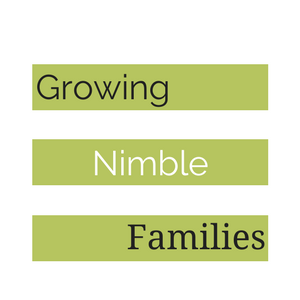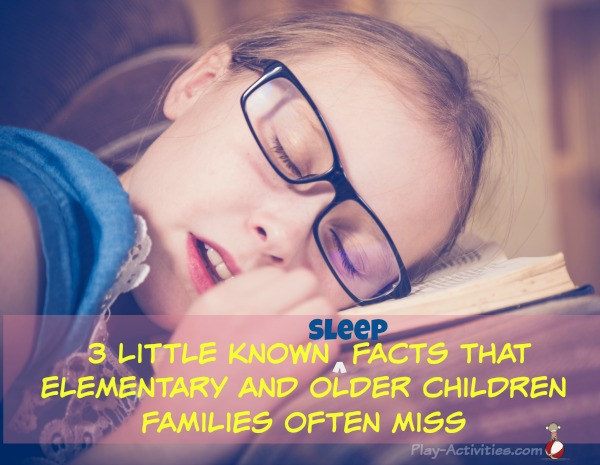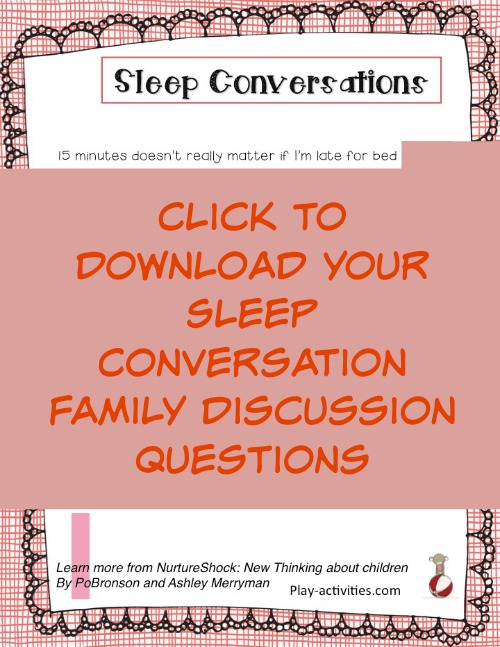Po Bronson and Ashley Merryman share the skinny on sleep in NurtureShock: New Thinking about children.
They collect in one place lots of the current science and sleep facts on different subjects. Often we as parents have a common sense notion about things based on us. But children are different they aren’t little adults.
Sleep is one of those things. We think that our sleep problems and the children’s sleep problems are the same. (They are not!)
The earlier we can set down patterns of good sleep habits the better it will be for our family flow and family atmosphere.
Here are three highlights from the sleep chapter
Sleep fact. 1. Sleep matters even after they are sleeping through the night
“It is an overlooked fact that children – from elementary school through high school- get an hour less sleep each night than they did thirty years ago. While modern parents obsess about our babies’ sleep, this concern falls off the priority list after preschool. Even Kindergartners get thirty minutes less a night than they used to.”
- Have a regular bedtime.
- Talk about the importance of ( everyone) having a regular bedtime.
Sleep fact.2 Make sure they get good quality sleep
” Because children’s brains are a work in progress until the age of 21, and because much of that work is done while a child is asleep, this lost hour appears to have an exponential impact on children that it simply doesn’t have on adults.”
- Our sleep and their sleep is different. When we lose sleep it doesn’t impact us nearly as much as it impacts the children.
- Shaving time off sleep has knock on effects over time. More so for children than us.
- Protecting sleep time is a family affair even as they get older up into the middle and high school years good sleep habits are important to talk about and live.
Sleep fact.3. There’s something to the line, “If you want to remember it it sleep on it!”
“…during sleep, the brain shifts what it learned that day to more efficient storage regions of the brain. Each stage of sleep plays its own unique role……the more you learned during the day, the more you need to sleep that night.”
- When children know that the hard things they learned today are ‘slotted’ into many different memory areas at night and that they need a good type of sleep to do this maybe they’ll understand the need for sleep.
- Just like nutrition and exercise we can make choices when we understand what’s at stake.
Sleep and lack of it maybe something to investigate in your family. As the children get older with extra curricular activities and homework bedtimes become a lot more fluid. One day there’s a lot of activities and the next perhaps hardly any. Each week a different puzzle of events. It’s easy for activities to creep up on you. The evening time is a dance for many parents and families juggling different commitments.
For many families we need to establish if the amount of extra curricular activity is too much for our particular child at this particular season. It’s hard to not feel the pressure to keep up with those around. Just like toddlers get over tired and we know that the bewitching hour is real, we have to help our children find the right blend of sleep, work, play and downtime.
Sometimes it’s a question of time management and priorities- when are they getting down to work? What time of day do they do their best work? Should they do work first then play or play first then work?
If our children knew that all that hard work they learned today needs time to process ( See #3) maybe they’ll slow down asking for that last drink, tell that final story or put down the device if they realised pinching time off sleep might mean learning it all over again…..
What next?
Download this discussion sheet printable to help start the conversations about sleep and check out the book for more insights and information.
Go deeper in this parenting podcast: Why losing sleep is a big deal for kids
This post contains affiliate links.
There is a good reason why our children should go to bed at a reasonable time. It’s time they understood the why too.












